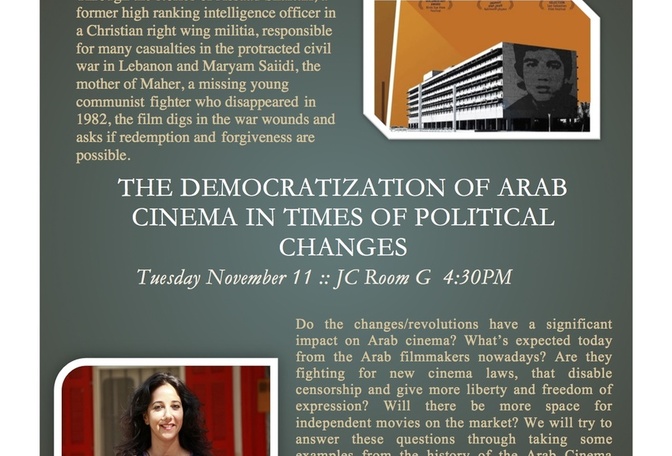- FAMA
- Researchers
-
Projects
- MESPI
- Knowledge Production Project >
-
Political Economy Project
>
- Development and the Uprisings
- Class Formations and Dynamics
- The Palestinian Economy: Fragmentation and Colonization
- Tunisia: A Political Economy in Transition
- Migrant States, Mobile Economies: Rethinking the Political in Contemporary Turkey
- Political Economy of the Middle East: Continuities & Discontinuities in Teaching & Research
- 2016 Political Economy Institute
- The Lebanon Project >
- The Palestine Project >
- The Civil Society Project >
- Middle East Media Project >
- The Egypt Project >
- Refugees and Migrants Project >
- Black-Palestinian Transnational Solidarities Project
- Initiatives
- Events
- Summer Institutes
- Internships
- Blog
|
November 11, 2014 @ 4:30pm
Johnson Center Room G George Mason University Fairfax, Virginia Presented by the Middle East Studies Program, Arab Studies Institute, and Middle East Etc. Film Club Featuring... Eliane Raheb, director Do the changes/revolutions have a significant impact on Arab cinema? And if yes how? Is it in its form, content, language or institutions? What’s expected today from the Arab filmmakers nowadays? Are they fighting for new cinema laws, that disable censorship and give more liberty and freedom of expression? Will there be more space for independent movies on the market? We will try to answer these questions through taking some examples from the history of the Arab Cinema that were influenced by the winds of changes of the 60s, 70s and 80s eras (Algeria, Palestine, Syria, Egypt, Lebanon), and compare them to today’s cinema trends in Tunisia, Egypt and Syria, with a reflection on the role of cinema in times of changes, fiction v/s documentary. About The Director Eliane Raheb is born in Lebanon and is the director of 2 short films: The last screening and Meeting, and of the documentaries : Karib Baiid (So near yet so far), Intihar (Suicide) and Hayda Lubnan (“This is Lebanon”) which received the Excellency Award at the Yamagata film festival, and was broadcasted on ARTE/ZDF/ Al Jadeed and NHK. Layali Bala Noom (Sleepless nights) is her first feature documentary. With Nizar Hassan, she founded ITAR productions, and the cross media documentary Arabi Hor (Free Arabs) www.arabihor.com, a project on the dailies of people within the Arab revolutions, that produced 160 short documentaries aired online. She is also one of the founders of the cultural cooperative for cinema Beirut DC , where she was the artistic director of “Ayam Beirut al Cinem’iya” film festival for 6 editions.
0 Comments
Leave a Reply. |
Forum on Muslim and Arab AffairsFAMA is the research arm of the Arab Studies Institute. Archives
June 2017
Categories |
- FAMA
- Researchers
-
Projects
- MESPI
- Knowledge Production Project >
-
Political Economy Project
>
- Development and the Uprisings
- Class Formations and Dynamics
- The Palestinian Economy: Fragmentation and Colonization
- Tunisia: A Political Economy in Transition
- Migrant States, Mobile Economies: Rethinking the Political in Contemporary Turkey
- Political Economy of the Middle East: Continuities & Discontinuities in Teaching & Research
- 2016 Political Economy Institute
- The Lebanon Project >
- The Palestine Project >
- The Civil Society Project >
- Middle East Media Project >
- The Egypt Project >
- Refugees and Migrants Project >
- Black-Palestinian Transnational Solidarities Project
- Initiatives
- Events
- Summer Institutes
- Internships
- Blog


 RSS Feed
RSS Feed
